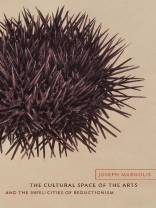Joseph Margolis, known for his considerable contributions to the philosophy of art and aesthetics, pragmatism, and American philosophy, has focused primarily on the troublesome concepts of culture, history, language, agency, art, interpretation, and the human person or self. For Margolis, the signal problem has always been the same: how can we distinguish between physical nature and human culture? How do these realms relate?
The Cultural Space of the Arts and the Infelicities of Reductionism identifies a conceptual tendency that can be drawn from the work of the twentieth century’s best-known analytic philosophers of art: Arthur Danto, Richard Wollheim, Kendall Walton, Nelson Goodman, Monroe Beardsley, Noël Carroll, and Jerrold Levinson, among others. This trend threatens to impoverish our grasp and appreciation of the arts by failing to do justice to the culturally informed nature of the arts themselves. Through his analysis, Margolis sets out to retrieve an adequate picture of the essential differences between physical nature and human cultureparticularly through language, history, meaning, significance, the emergence of the human self or person, and the essential features of human lifeall to explain how such difference bears on our perception of paintings and literature. Clearly argued and provocatively engaging, Margolis’s work reestablishes what is essential to a productive encounter with art.
Innehållsförteckning
Preface
First Words
1. Piecemeal Reductionism: A Sense of the Issue
2. The New Intentionalism
Interlude. A Glance at Reductionism in the Philosophy of Mind
3. Beardsley and the Intentionalists
4. Intentionalism’s Prospects
5. A Failed Strategy
Notes
Index
Om författaren
Joseph Margolis is Laura H. Carnell Professor of Philosophy at Temple University and has just completed the third of a trio of books surveying American philosophy in the second half of the twentieth century. This volume is one of three recently published works that link salient problems in the philosophy of art and the theory of culture.












